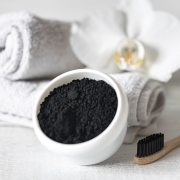Does Charcoal Toothpaste Actually Whiten Teeth?
Every few months or so, a new gimmick arrives on the market. In some cases the “gimmick” turns out to be helpful, such as when water flossers became popular. Sometimes the idea isn’t so helpful, such as when the market became flooded with toothpaste without fluoride. It’s important to distinguish between the new products that are helpful and ones that aren’t helpful or may even be harmful to your teeth and gums. To that end, many of our patients are asking whether a new fad—charcoal toothpaste—actually whitens teeth as advertised.
The Way Charcoal Toothpaste Works
Activated charcoal is highly porous and is believed to bind to surface stains on teeth caused by coffee, wine and other foods and drinks. Charcoal primarily works on external discoloration, which means it can help get rid of minor temporary discoloration, but it can’t change the color of enamel like professional teeth whitening in Jacksonville, FL can.
Potential Benefits and Drawbacks
Some users report that charcoal toothpaste leaves their teeth feeling cleaner and looking slightly brighter. However, scientific evidence on its effectiveness is limited. Dentists caution that frequent use of charcoal toothpaste can be too abrasive, wearing down enamel over time. Since enamel does not regenerate, excessive scrubbing could lead to increased tooth sensitivity and a higher risk of cavities. Additionally, charcoal does not contain fluoride, which helps strengthen enamel and prevent decay.
Should You Use Charcoal Toothpaste?
Charcoal toothpaste doesn’t impart significant benefits, so unless you’re especially attracted to it because it feels more natural, there’s no reason to go out of your way to use charcoal toothpaste. In fact, you may get more benefits from ADA-approved toothpaste offered by popular brands.
If teeth discoloration is a problem for you, visit your Jacksonville, FL dentist for professional teeth whitening and other ways to keep your teeth and gums looking their best.



